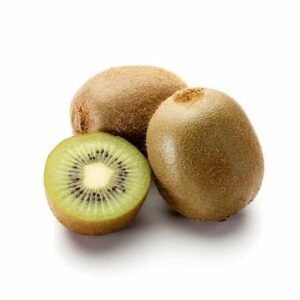
Rich in Vitamins and Nutrients
Kiwis are a nutritional powerhouse. They are an excellent source of vitamin C, containing more of it per serving than most other fruits, including oranges. Vitamin C is an essential antioxidant that helps boost the immune system, promote healthy skin, and aid in wound healing. Kiwis also provide vitamin K, vitamin E, vitamin A, folate, and potassium, all of which are vital for various bodily functions.Reference: Carr AC, Maggini S. Vitamin C and Immune Function. Nutrients. 2017;9(11):1211.
High in Fiber
Dietary fiber is crucial for maintaining digestive health and preventing constipation. Kiwis are packed with both soluble and insoluble fiber, aiding in regular bowel movements and promoting gut health. What sets kiwis apart is their unique combination of fiber types—soluble fiber helps soften stools, facilitating easier passage, while insoluble fiber adds bulk to the stool, preventing issues like diarrhea. This dynamic duo not only supports digestive regularity but also contributes to a balanced and healthy gastrointestinal system.Reference: McRorie Jr JW, McKeown NM. Understanding the Physics of Functional Fibers in the Gastrointestinal Tract: An Evidence-Based Approach to Resolving Enduring Misconceptions about Insoluble and Soluble Fiber. J Acad Nutr Diet. 2017;117(2):251-264.
Antioxidant Properties
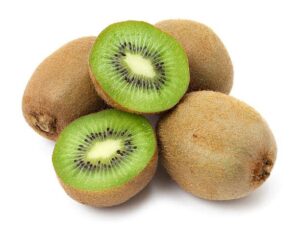 Kiwis are loaded with antioxidants, including vitamin C, vitamin E, and carotenoids, which help protect cells from damage caused by free radicals. This antioxidant activity can reduce the risk of chronic diseases, such as heart disease and cancer.In addition to vitamin C, renowned for its immune-boosting qualities, kiwis contain high levels of polyphenols, such as quercetin and lutein. These compounds work synergistically with vitamins C and E to provide robust protection against oxidative stress, fostering a more comprehensive defense mechanism against cellular damage.Furthermore, the unique enzymatic composition of kiwis, including actinidain, contributes to their antioxidant prowess. Actinidain not only aids in digestion by breaking down proteins but also exhibits anti-inflammatory and immune-modulating properties, enhancing the overall health benefits derived from kiwi consumption. The distinctive combination of antioxidants and bioactive compounds in kiwis underscores their potential to support a resilient and well-rounded defense against oxidative challenges, promoting longevity and vitality.
Kiwis are loaded with antioxidants, including vitamin C, vitamin E, and carotenoids, which help protect cells from damage caused by free radicals. This antioxidant activity can reduce the risk of chronic diseases, such as heart disease and cancer.In addition to vitamin C, renowned for its immune-boosting qualities, kiwis contain high levels of polyphenols, such as quercetin and lutein. These compounds work synergistically with vitamins C and E to provide robust protection against oxidative stress, fostering a more comprehensive defense mechanism against cellular damage.Furthermore, the unique enzymatic composition of kiwis, including actinidain, contributes to their antioxidant prowess. Actinidain not only aids in digestion by breaking down proteins but also exhibits anti-inflammatory and immune-modulating properties, enhancing the overall health benefits derived from kiwi consumption. The distinctive combination of antioxidants and bioactive compounds in kiwis underscores their potential to support a resilient and well-rounded defense against oxidative challenges, promoting longevity and vitality.Reference: Vinha AF, Alves RC, Barreira SV, Costa AS, Oliveira MB. New insights on the antioxidant activity of kiwi fruits. Food Chemistry. 2016;196:877-884.
Heart Health
The potassium content in kiwis supports heart health by helping to regulate blood pressure. Additionally, the dietary fiber and antioxidants in kiwi contribute to lower cholesterol levels, reducing the risk of heart disease.Furthermore, the unique combination of phytonutrients found in kiwis, including carotenoids, flavonoids, and polyphenols, plays a pivotal role in promoting heart health. These compounds possess anti-inflammatory and vasodilatory properties, aiding in the relaxation of blood vessels and reducing the risk of atherosclerosis, a condition characterized by the hardening of arteries.Moreover, the abundance of vitamin K in kiwis contributes to cardiovascular well-being by supporting proper blood clotting mechanisms. This multifaceted approach underscores the exceptional cardiovascular benefits that kiwis offer, making them a delicious and nutritious addition to a heart-healthy diet.Reference: Wu F, Wilson JX, Tyml K. Ascorbate inhibits iNOS expression and preserves vasoconstrictor responsiveness in skeletal muscle of septic mice. American Journal of Physiology-Heart and Circulatory Physiology. 2003;285(6):H2355-H2361.
Improved Digestive Health
Kiwis contain an enzyme called actinidin, which aids in the digestion of proteins. This enzyme can be especially helpful for individuals with digestive disorders, such as irritable bowel syndrome (IBS).Furthermore, the unique composition of kiwis, including vitamins, antioxidants, and natural sugars, contributes to a well-rounded approach to digestive well-being, making them a delightful addition to a diet aimed at promoting overall gut health.Reference: Montalto M, Curigliano V, Santoro L, et al. Management and treatment of lactose malabsorption. World J Gastroenterol. 2006;12(2):187-191.
Skin Health
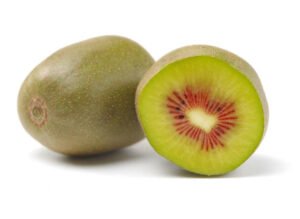 The vitamin C and vitamin E content in kiwis can promote healthy, radiant skin by supporting collagen production and protecting against UV damage.Kiwis, with their high levels of vitamin C, play a crucial role in collagen synthesis, a protein essential for maintaining skin elasticity and preventing premature aging.Additionally, the antioxidants found in kiwis, including vitamin E, help combat oxidative stress, reducing the appearance of fine lines and wrinkles. The unique combination of nutrients in kiwis makes them a skin-friendly fruit, providing comprehensive support for a youthful and vibrant complexion.
The vitamin C and vitamin E content in kiwis can promote healthy, radiant skin by supporting collagen production and protecting against UV damage.Kiwis, with their high levels of vitamin C, play a crucial role in collagen synthesis, a protein essential for maintaining skin elasticity and preventing premature aging.Additionally, the antioxidants found in kiwis, including vitamin E, help combat oxidative stress, reducing the appearance of fine lines and wrinkles. The unique combination of nutrients in kiwis makes them a skin-friendly fruit, providing comprehensive support for a youthful and vibrant complexion.Reference: Pullar JM, Carr AC, Vissers MCM. The Roles of Vitamin C in Skin Health. Nutrients. 2017;9(8):866.
Weight Management
Kiwis are a low-calorie fruit with high fiber content, making them an excellent choice for those looking to manage their weight. The fiber in kiwis helps you feel fuller for longer, reducing the likelihood of overeating.Their rich fiber content aids in promoting a gradual release of energy, preventing sudden spikes and crashes in blood sugar levels. Additionally, the combination of fiber and antioxidants in kiwis supports digestive health, facilitating a more efficient metabolism and contributing to an overall balanced approach to weight management.Reference: Hoad CL, Rayment P, Spiller RC, Marciani L, de Celis Alonso B, Traynor C, et al. In vivo imaging of intragastric gelation and its effect on satiety in humans. The Journal of nutrition. 2004;134(9):2293-300.
Blood Sugar Control
 For individuals with diabetes or those at risk of developing the condition, kiwis can be a valuable addition to the diet. Kiwis have a low glycemic index, which means they do not cause rapid spikes in blood sugar levels. The fiber content also helps regulate blood sugar.Furthermore, kiwis are rich in antioxidants, particularly vitamin C and polyphenols, which have been associated with improved insulin sensitivity. These compounds may play a role in mitigating oxidative stress and inflammation, contributing to better blood sugar control. Additionally, the presence of serotonin in kiwis may have a positive impact on mood and stress levels, potentially influencing hormonal balance and indirectly supporting blood sugar managemen.
For individuals with diabetes or those at risk of developing the condition, kiwis can be a valuable addition to the diet. Kiwis have a low glycemic index, which means they do not cause rapid spikes in blood sugar levels. The fiber content also helps regulate blood sugar.Furthermore, kiwis are rich in antioxidants, particularly vitamin C and polyphenols, which have been associated with improved insulin sensitivity. These compounds may play a role in mitigating oxidative stress and inflammation, contributing to better blood sugar control. Additionally, the presence of serotonin in kiwis may have a positive impact on mood and stress levels, potentially influencing hormonal balance and indirectly supporting blood sugar managemen.Reference: Jenkins DJ, Wolever TM, Taylor RH, Barker H, Fielden H, Baldwin JM, et al. Glycemic index of foods: a physiological basis for carbohydrate exchange. The American journal of clinical nutrition. 1981;34(3):362-6.
Eye Health
Kiwis are rich in carotenoids such as lutein and zeaxanthin, which are essential for maintaining eye health. These compounds help protect against age-related macular degeneration and cataracts.Furthermore, kiwis distinguish themselves in the realm of eye health by offering a unique combination of potent antioxidants, including vitamin C and E. These antioxidants work in tandem with carotenoids to neutralize free radicals, reducing oxidative stress and inflammation in the eyes. The high vitamin C content in kiwis not only supports collagen production for maintaining the structure of the eye but also contributes to overall ocular vitality.Reference: Ma L, Lin XM. Effects of lutein and zeaxanthin on aspects of eye health. Journal of the Science of Food and Agriculture. 2010;90(1):2-12.
Better Sleep
Consuming kiwis before bedtime may improve sleep quality. Kiwis are a natural source of serotonin, a hormone that helps regulate sleep cycles. Additionally, the high levels of antioxidants in kiwis may reduce oxidative stress, promoting a more restful sleep.Moreover, kiwis are rich in vitamin C, which not only enhances the immune system but also aids in the production of melatonin, a hormone crucial for regulating the sleep-wake cycle. The combination of serotonin and melatonin, both naturally occurring in kiwis, creates a dynamic duo that fosters a deeper and more rejuvenating sleep experience.Reference: Lin HH, Tsai PS, Fang SC, Liu JF. Effect of kiwifruit consumption on sleep quality in adults with sleep problems. Asia Pacific journal of clinical nutrition. 2011;20(2):169-74.
Immune Support
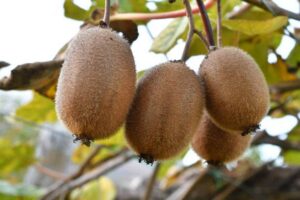 The combination of vitamin C, vitamin K, and other antioxidants in kiwis can boost the immune system, helping the body defend against infections and illnesses.Moreover, kiwis are renowned for their exceptional immune-boosting properties due to the presence of phytonutrients and flavonoids. These bioactive compounds in kiwis have been shown to enhance the body’s defense mechanisms, providing an extra layer of protection against common ailments.
The combination of vitamin C, vitamin K, and other antioxidants in kiwis can boost the immune system, helping the body defend against infections and illnesses.Moreover, kiwis are renowned for their exceptional immune-boosting properties due to the presence of phytonutrients and flavonoids. These bioactive compounds in kiwis have been shown to enhance the body’s defense mechanisms, providing an extra layer of protection against common ailments.Reference: Hemilä H, Chalker E. Vitamin C for preventing and treating the common cold. Cochrane Database Syst Rev. 2013;1(1):CD000980.
Anti-Inflammatory Properties
Kiwi consumption may help reduce inflammation in the body due to its high antioxidant content. Chronic inflammation is associated with various diseases, including heart disease and arthritis.Moreover, kiwis stand out for their unique combination of bioactive compounds, including the enzyme actinidain. Actinidain, found in high concentrations in kiwi, has been shown to possess anti-inflammatory properties by aiding in the breakdown of proteins. This enzymatic activity not only contributes to improved digestion but also plays a role in mitigating inflammation, offering a distinctive edge in promoting overall health.Reference: Calder PC, Albers R, Antoine JM, et al. Inflammatory disease processes and interactions with nutrition. The British journal of nutrition. 2009;101(S1):S1-45.
Cancer Prevention
Some studies suggest that the antioxidants in kiwis may have a protective effect against certain types of cancer. The high vitamin C content can help combat oxidative stress, which is a risk factor for cancer development.Moreover, kiwis stand out due to their rich array of phytochemicals, such as carotenoids and flavonoids, which have been associated with anti-cancer properties. Additionally, the presence of fiber in kiwis contributes to a healthy digestive system, potentially playing a role in reducing the risk of gastrointestinal cancers.Reference: Ames BN, Gold LS, Willett WC. The causes and prevention of cancer. Proc Natl Acad Sci U S A. 1995;92(12):5258-65.
Improved Respiratory Health
The high vitamin C content in kiwis can benefit respiratory health. It may help reduce the severity and duration of respiratory infections, such as the common cold and asthma symptoms.Moreover, the unique combination of antioxidants and phytochemicals found in kiwis contributes to their anti-inflammatory properties, further supporting respiratory health.Additionally, kiwis are rich in bioactive compounds like quercetin, which has been associated with bronchodilator effects, aiding in the relaxation of bronchial muscles and facilitating easier breathing.Reference: Hemilä H, Louhiala P. Vitamin C for preventing and treating pneumonia. Cochrane Database Syst Rev. 2013;CD005532.
Bone Health
Kiwis contain vitamin K, which plays a crucial role in bone health by aiding in calcium absorption and bone mineralization. This can help maintain strong and healthy bones.Continuing with the focus on bone health, kiwis stand out for their unique combination of nutrients that contribute to skeletal well-being. In addition to vitamin K, kiwis boast a substantial amount of vitamin C, which plays a pivotal role in collagen synthesis. Collagen is a key component of bone structure, providing the framework for bone strength and resilience.Reference: Booth SL. Roles for vitamin K beyond coagulation. Annu Rev Nutr. 2009;29:89-110.
Aid in Digestive Enzymes
Kiwis contain enzymes like actinidin, which can assist in breaking down proteins, making them easier to digest. This can be particularly helpful for those with digestive issues.In addition to aiding in the breakdown of proteins, kiwis stand out for their unique digestive properties. The high fiber content in kiwis, including both soluble and insoluble fiber, contributes to a healthy digestive system by promoting regular bowel movements and preventing constipation.Reference: Leung KC, Li KM, Wong YH. A study of the action of actinidin on the composition of the ileal digesta and the stimulation of ileal digesta production. J Sci Food Agric. 1980;31(1):43-50.
Skin Protection
Apart from promoting skin health, kiwis’ antioxidants can also help protect the skin from UV-induced damage, reducing the risk of premature aging and skin cancer.Furthermore, kiwis stand out for their high vitamin C content, a potent antioxidant that plays a crucial role in collagen synthesis. Collagen is a structural protein essential for maintaining skin elasticity and firmness. By supporting collagen production, kiwis contribute to a resilient and youthful complexion, offering a dual defense against both environmental stressors and natural aging processes.Reference: Nichols JA, Katiyar SK. Skin photoprotection by natural polyphenols: anti-inflammatory, antioxidant and DNA repair mechanisms. Arch Dermatol Res. 2010;302(2):71-83.Better Mental Health
The presence of serotonin in kiwis may also have a positive impact on mood and mental health. Serotonin is often referred to as the “feel-good” neurotransmitter and plays a role in reducing symptoms of depression and anxiety.Furthermore, the presence of folate in kiwis is essential for cognitive function, playing a key role in neurotransmitter synthesis and supporting overall mental well-being. The distinctive blend of these nutrients in kiwis makes them a flavorful and nutritious choice for promoting not only physical but also mental vitality.Reference: Young SN. How to increase serotonin in the human brain without drugs. J Psychiatry Neurosci. 2007;32(6):394-9.
Nutritional Value of Kiwifruit (per 100 grams)
- Calories: Approximately 61 kcal
- Kiwifruit is relatively low in calories, making it a healthy choice for those watching their calorie intake.
- Carbohydrates: About 14.7 grams
- Kiwis are a good source of carbohydrates, primarily natural sugars (fructose and glucose) and dietary fiber.
- Dietary Fiber: Approximately 3 grams
- Kiwifruit contains a moderate amount of dietary fiber, which supports digestive health and helps maintain a feeling of fullness.
- Protein: Roughly 1.1 grams
- While not a significant source of protein, kiwis do contribute some to your daily protein intake.
- Fat: Less than 0.5 grams
- Kiwis are very low in fat, making them a healthy option for those looking to reduce fat intake.
- Vitamin C: About 92 mg (more than 100% of the recommended daily intake)
- Kiwifruit is renowned for its high vitamin C content, which is essential for immune support and skin health.
- Vitamin K: Approximately 40.3 micrograms (around 50% of the recommended daily intake)
- Kiwis contain a significant amount of vitamin K, important for bone health and blood clotting.
- Vitamin E: Roughly 1.5 mg
- This vitamin is an antioxidant and contributes to skin health.
- Vitamin A: About 87 micrograms
- Kiwis provide a small amount of vitamin A, which is beneficial for eye health and immune function.
- Folate (Vitamin B9): Approximately 25 micrograms
- Folate is essential for DNA synthesis and cell growth.
- Potassium: Around 312 mg
- Kiwifruit is a good source of potassium, important for heart health and maintaining blood pressure.
- Calcium: About 34 mg
- While not as high as some other fruits, kiwis do contain calcium, which supports bone health.
- Iron: Roughly 0.3 mg
- Kiwis provide a small amount of iron, which is important for transporting oxygen in the blood.
- Magnesium: Approximately 17 mg
- Magnesium is involved in various biochemical reactions in the body.
- Phosphorus: About 30 mg
- Phosphorus is important for bone and teeth health.
- Zinc: Less than 0.1 mg
- Kiwifruit contains a minimal amount of zinc, which is important for immune function and wound healing.
- Copper: Approximately 0.1 mg
- Copper is essential for various enzymatic reactions in the body.
- Manganese: Roughly 0.1 mg
- Manganese plays a role in bone formation and metabolism.
- Selenium: Less than 0.1 micrograms
- Kiwis contain a negligible amount of selenium.
Conclusion
Kiwifruit is more than just a tasty addition to your diet. It offers a plethora of health benefits backed by scientific research. From boosting the immune system to aiding digestion and promoting heart health, the consumption of kiwis can have a positive impact on your overall well-being. Incorporating this “superfood” into your daily diet can be a delicious way to support a healthier lifestyle.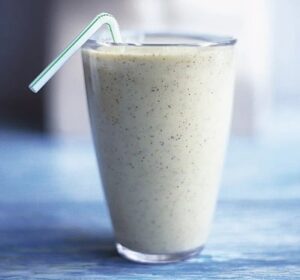 Looking for a vibrant and refreshing way to kickstart your day? Jamie Oliver’s Kiwi Fruit, Ginger, and Banana Smoothie is the perfect answer. This delightful smoothie combines the zesty goodness of kiwi, the gentle warmth of ginger, and the natural sweetness of bananas, creating a harmonious blend of flavors that’s as nutritious as it is delicious.
Looking for a vibrant and refreshing way to kickstart your day? Jamie Oliver’s Kiwi Fruit, Ginger, and Banana Smoothie is the perfect answer. This delightful smoothie combines the zesty goodness of kiwi, the gentle warmth of ginger, and the natural sweetness of bananas, creating a harmonious blend of flavors that’s as nutritious as it is delicious.Contraindications for consuming kiwifruit:
Allergic Reactions:Some individuals may be allergic to kiwifruit, which can lead to symptoms such as itching, swelling of the lips or tongue, hives, and difficulty breathing. If you suspect a kiwi allergy, seek medical attention immediately.
Oral Allergy Syndrome (OAS):Kiwifruit can trigger OAS in individuals with pollen allergies, particularly to birch or ragweed pollen. Symptoms may include itching or tingling in the mouth and throat. Peeling the kiwi before consumption may help reduce these symptoms.
Digestive Sensitivity:Kiwifruit contains enzymes like actinidin, which can sometimes cause discomfort in individuals with sensitive digestive systems or gastrointestinal conditions like gastroesophageal reflux disease (GERD).
Drug Interactions:Kiwifruit can interact with certain medications. For example, it may enhance the effects of blood-thinning medications due to its vitamin K content. If you are on medication, consult your healthcare provider regarding kiwi consumption.
High Potassium Intake:While potassium is generally beneficial for most people, individuals with kidney problems or those on potassium-restricted diets should monitor their intake of high-potassium foods, including kiwifruit.
Tooth Sensitivity:The acidity in kiwifruit can affect tooth enamel. If you have sensitive teeth or a history of dental problems, it’s advisable to rinse your mouth with water after consuming kiwi to minimize potential enamel erosion.
Medications for Blood Pressure:Kiwifruit may slightly lower blood pressure due to its potassium content. If you are taking medications to lower blood pressure, monitor your blood pressure levels regularly to avoid excessive drops.
Gastrointestinal Upset:In rare cases, consuming large quantities of kiwi, especially if it’s very ripe, may cause gastrointestinal upset, including diarrhea or abdominal discomfort.
Interaction with Latex Allergy:Kiwifruit can cross-react with latex allergies, potentially causing allergic reactions in some individuals with latex sensitivity.
It’s important to note that while these contraindications and considerations exist, kiwifruit is generally safe for most people when consumed in moderation as part of a balanced diet. If you have specific health concerns or dietary restrictions, it’s advisable to consult with a healthcare professional or a registered dietitian before making significant changes to your diet, including the addition of kiwifruit.Fascinating Facts About Kiwis
- Prehistoric Roots:
- Sensitive Souls:
- Egg-Shaped Inspiration:
- Vibrant Inside and Out:
- Kiwis and Pregnancy:
- Global Kiwi Capital:
- Anti-Wrinkle Agent:
- Kiwi Mythology:
- Kiwis and Copper:
- Kiwi Couture:
- Botanical Oddity:
- Kiwis on the Vine:
- Kiwi’s Acidic Tang:
- Kiwis and the Butterfly Effect:
- Kiwi Clones:
- International Harvest:
- Kiwi-Powered Energy:
- Kiwi’s Water-Loving Nature:
- Kiwi’s Antioxidant Arsenal:
- Kiwis on Your Plate and in Your Glass:
See the benefits for: Hair , Skin , Heart , Bones , Liver , Brain , Eyes , Kidney , Lungs , Stomach , Gallbladder , Blood vessels, Immune system
Disclaimer:
The information provided in this article is for educational purposes only and does not replace professional medical advice. Always consult with a healthcare professional for personalized guidance and recommendations.
